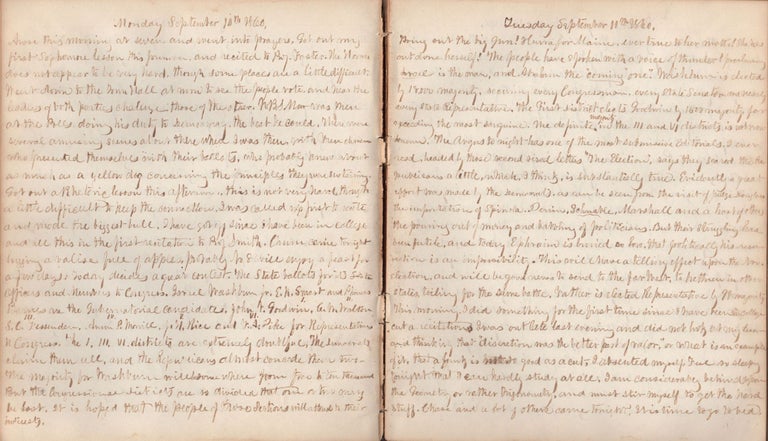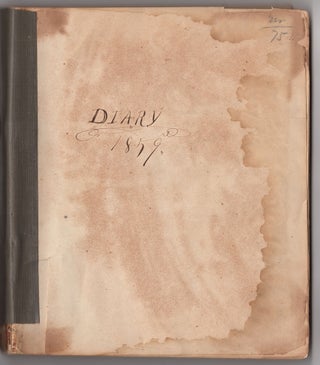Diary 1859. P. Bonney West Minot, ME. Jan. 18th 1859.
Lewiston, Waterville, Maine: January 18 1859–June 6 1861. Diary 8vo (205mm x 175). 252 pp. of manuscript, 19 blank leaves. An engaging diary kept by a student at the Maine State Seminary (later known as Bates College) who then transferred to Waterville College (later known as Colby College) offering intimate portraits of both schools in the mid-19th century. Bonney’s diary commences on January 18, 1859, on which day he remarks: “I regard diary keeping as a thing of vast importance, for it not only serves to aid the memory of a person but also to strengthen it.” In this opening entry he also relates that he has secured a room at the Maine State Seminary (est. 1855) in Lewiston where the spring term starts in three weeks. On February 7, 1859, he comments : “the institution has been in operation but little over a year, and already it is counted one of the best, if not the best school of the kind in the State.” The following day the term begins and he offers brief portraits of his male and female instructors. The student-body totaled over 100 pupils at the time. The bulk of this diary concerns Bonney’s daily activities such as his weekly public recitations; journeys home to West Minot; churchgoing activities; travels around Maine, and so on. The writing is interesting throughout and Bonney is an intelligent and observant young man. Bonney’s family were evidently Baptists (Bates was founded by Free-Will Baptists), and he often mentions his father’s churchgoing activities in Portland and other Maine locales. Some of the meetings Bonney attends include those of the Literary Fraternity and the Ladies Athenaeum. His studies include geometry, Latin, and Greek and the literary works of Milton, Cicero, Virgil, and Longfellow. In his spare time he goes fishing, hunting, and spends time with friends, both male and female. On April 26, 1859, he relates that the previous night he and his friend Henry “went off on a ‘toot’ to see some girls, and got back, no matter when ---.” At the Seminary Bonney is exposed to much abolitionist thought. He frequently attends lectures on slavery, and later—at Waterville College on June 4, 1860—he will attend a lecture given by a freed ex-slave on “African colonization.” At its foundation in 1855, the Maine State Seminary was one of a handful of colleges in America that admitted black students before the Emancipation Proclamation and the 13th Amendment. At one point he attends a school social at which faculty are present; he writes, “it is surely a horrid thing for ladies and gentlemen to mingle in the eyes of the faculty of the Maine State Seminary, as indeed it is, only think for a gent to speak to a lady! I have scarcely done it for four weeks, I shall hardly know how to act, or what to say when I do see one.” In another humorous instance, he relates the story of a churchman by the name of Mr. Weber who “was dismissed from the church, on account of his kissing a lady whom he had married.” In another entry, he relates the tragic fortune of one Mr. Holey, a preacher who “lost a wife and eight children, his whole family, by the washing away of an embankment about a year ago at Illinois.” On August 10, 1859, Bonney becomes a freshman at Waterville College (est. 1813 and later Colby College) where he hopes to stay for four years; around this time he visits Augusta for the first time. At Waterville College he becomes involved with the lively and fractious fraternity scene. Many scuffles occur between the clubs and the majority of them center around one ruffian by the name of Millikan, whom Bonney refers to as “the donkey.” He relates one incident: Mr. Hall a sophomore was swinging upon the pole when Millikan came dwelling around with his Kappa cap upon his head, and asked Hall if he “had got his coffin made yet,” Hall told him not to sauce him, but Millikan returned the very polite answer, “go to the d—l” when Mr. Millikan was seized by the color by Hall, and underwent a very severe shaking together with a punch in the ribs and a kick in the posterior. On April 14, 1860, Bonney begins reading “Humboldt's narratives of his researches in South America and Mexico in 1799–1804.” The following month he sees the Portland Band play, which he calls “one of the best bands in New England.” “They gave a concert this evening which I attended. It was good, first rate, in particular one piece, entitled ‘Cuckoo Polka.’” In addition to his studies, Bonney evidences a strong social conscience and he frequently comments at length on both state and national politics. He takes much interest in the election of Abraham Lincoln, and on June 6, 1861, his journal ends amidst the outbreak of the Civil War. SOME REPRESENTATIVE PASSAGES 16 April 1859 “Left the Maine State Seminary this noon for home—having been absent ten weeks, the longest time that I ever spent away from home at one time. Nine of us piled into the back and started for the depot, amid numerous ‘good byes’ from out fellow students…with rain pouring in torrents…before we arrived at the depot the back got stuck in the mud, and we had the fun of getting out and also of getting wet and muddy.” 17 Oct. 1859 “The donkey of a Millikan came into recitation this morning with a shingle whittled in the shape of a diamond, pinned upon his neck tie probably mimicking the freshman pins. Also he came out today with a cap nearly resembling ours though with some difference. A meeting has been called to consider…removing the cap from the jackass’s head.” 19 Oct. 1859 “My mind turns with pleasure to the many incidents which took place at Hebron, especially am I reminded of them these good many[?] October evening when last fall and a year ago last fall in the company of some good damsel we went out for a pleasant walk. With pleasure shall I ever dwell upon those occurrences.” 4 Nov. 1859 “Old Brown as he is commonly called was sentenced yesterday in a town of Virginia to be hung by the neck upon the second day of December next. This man some two years since was in Kansas and avenged the death of his son at Osawatomie…” 11 Nov. 1859 “Came very near flunking in Geometry this morning. It was the fourteenth proposition of the fifth book, which is not very hard, but I had entirely forgotten it. With the aid of a piece of paper A[?] Bierce who sat beside me, I finally went through with it after a fashion.” CONDITION: Very good.
Item #4461
Sold



